Do you want to know How Do You Upload Sounds To Tiktok and make your mark on the platform? Look no further; this guide will explore how to upload sound effects and songs to TikTok, and strategies to help you broaden your audience. At streetsounds.net, we provide the resources and guidance you need to navigate the world of TikTok audio successfully. This guide will cover using sound snippets and discuss how to distribute your original tracks.
1. Understanding TikTok Sounds
TikTok thrives on “sounds,” which are audio clips central to most videos. These can range from snippets of songs to environmental recordings, spoken phrases, or sound effects.
1.1. The Power of Sounds on TikTok
Sounds on TikTok are more than just background noise; they are a crucial engagement tool.
- Ubiquitous Use: Videos on TikTok heavily depend on sounds to set the tone, drive engagement, and create trends.
- Versatile Sources: Sounds are not restricted to music; they include everything from nature sounds to funny quotes.
- Algorithmic Amplification: Once a video with a sound is posted, the TikTok algorithm helps it reach viewers who can then engage by liking, sharing, or using the sound in their videos.
1.2. How Sounds Create Engagement
Sounds drive engagement through shares and the use of sounds by other creators.
- Sound as a Shared Resource: When a user uses a sound from your video, it provides a direct link back to your original content, boosting visibility and potentially drawing new followers.
- Examples of Viral Sounds: Sounds like “Money, Spinning Monkeys” have been used in millions of videos, illustrating how a single sound can achieve widespread popularity.
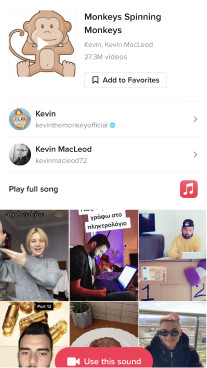 Popular Sounds Uploaded On TikTok
Popular Sounds Uploaded On TikTok
Alt text: A screenshot of the TikTok app showing popular sounds being used in various videos
1.3. Creating Your Own Sound
Creating a sound on TikTok is user-friendly.
- Simple Recording: Start by recording a video with your chosen audio directly on your device.
- Immediate Availability: After posting, the audio from your video becomes available for others on TikTok to use.
- Creator Attribution: When someone uses your sound, they credit you as the original creator, enhancing your discoverability.
1.4. Case Study: Morgan Kennedy’s Guitar Loop
Consider Morgan Kennedy, a guitarist whose looped guitar sound became a TikTok hit.
- Organic Growth: Morgan simply posted a video of her playing a guitar loop.
- User Adoption: Her sound was used in over 335,000 videos, vastly increasing her reach and introducing her music to countless new listeners.
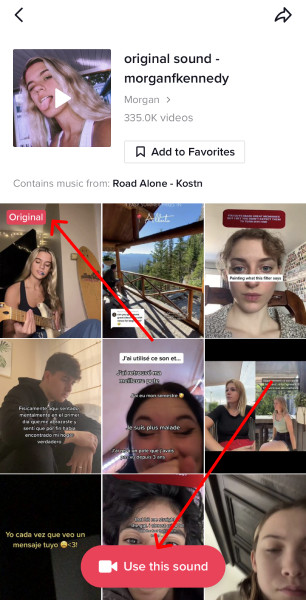 Using Someone Elses Sound On TikTok
Using Someone Elses Sound On TikTok
Alt text: The TikTok interface showing Morgan Kennedy’s sound with the “Use this sound” button highlighted
2. Uploading Your Own Recorded Music as a TikTok Sound
To use your recorded tracks as sounds, you’ll need to integrate your audio into a video.
2.1. Step-by-Step Guide to Uploading Music
Follow these steps to upload your music so people can use it in their own TikTok videos.
- Record a Video: Begin by creating a video. You can record a live performance or use stock footage from platforms such as Pexels.
- Overlay Audio: Use video editing software like Final Cut Pro or iMovie to overlay your recorded music onto your video.
- Sync Audio and Video: Ensure that the audio and video are synchronized for a professional finish.
- Adjust Dimensions: Set your video dimensions to TikTok’s preferred size of 1080 x 1920 to ensure it displays correctly.
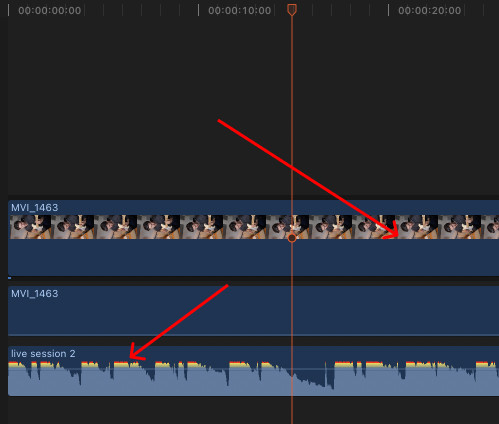 Editing TikTok Sound
Editing TikTok Sound
Alt text: A screenshot from Final Cut Pro showing the process of syncing audio and video tracks for a TikTok video
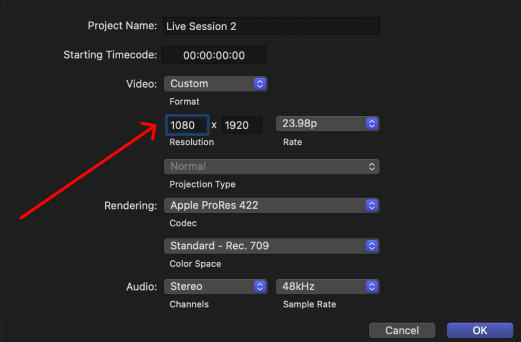 Exporting TikTok Sound
Exporting TikTok Sound
Alt text: Demonstrating how to adjust video dimensions in Final Cut Pro for optimal TikTok viewing
2.2. Example of Editing a TikTok Video
The video shows how to sync the music with the video to create a professional and engaging TikTok post.
2.3. Limitations of This Method
Be aware that sounds uploaded this way will not appear in the official TikTok Music Library. This method is best for sounds intended to accompany specific visuals.
3. Utilizing the TikTok Music Library
To ensure your music is accessible in TikTok’s music library, you need to use a music distributor.
3.1. What Is a Music Distributor?
A music distributor acts as a liaison between artists and digital music platforms such as TikTok, Spotify, and Apple Music.
- Distribution Network: These distributors upload your music to multiple streaming services, often over 150 platforms globally.
- Accessibility: They enable independent artists to reach a broad audience without directly negotiating with each platform.
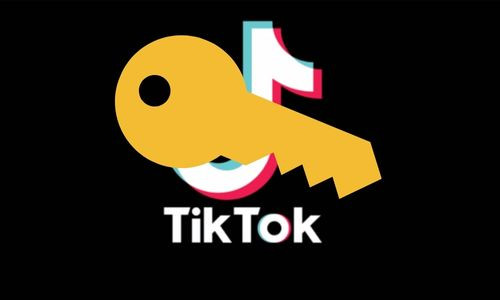 TikTok Music Distribution
TikTok Music Distribution
Alt text: A visual representation of a music distributor acting as a bridge between an artist and TikTok, facilitating music uploads
3.2. Why Use a Distributor?
Streaming services rely on distributors to maintain quality control and manage royalties.
- Quality Assurance: Distributors ensure that the music meets the technical requirements of each platform, including file format and artwork dimensions. They also verify copyright information.
- Royalty Management: They collect and distribute royalties earned from streaming, managing complex financial transactions and reporting.
![]() TikTok Music Copyright
TikTok Music Copyright
Alt text: Illustration showing how music distributors help ensure quality control and copyright compliance for music on TikTok
3.3. Cost Considerations
Music distributors offer varied pricing models, including annual fees or royalty sharing.
- Annual Fees: Many distributors charge an annual fee, allowing artists to retain 100% of their royalties.
- Free Options: Some distributors offer free services but may take a percentage of the royalties or offer fewer services.
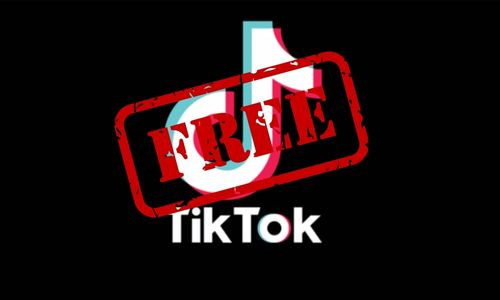 Paid Music Distribution
Paid Music Distribution
Alt text: A comparison of different music distribution pricing models, highlighting the pros and cons of each
4. Step-by-Step Guide: Uploading to TikTok via TuneCore
Using a distributor such as TuneCore is an efficient way to get your music onto TikTok.
4.1. Step 1: Sign Up with a Music Distributor
- Choosing a Distributor: Select a distributor that suits your needs. TuneCore is a popular choice, known for its comprehensive services and user-friendly platform.
- Sign-Up Process: Visit TuneCore and sign up for an account. Consider using available discounts, such as the 20% discount.
Alt text: An overview of various music distribution platforms available for artists looking to upload their music to TikTok
4.2. Step 2: Add a New Single
- Navigating the Platform: After signing up, navigate to the option to “add a new single” or “upload a new single”.
- Starting the Upload: This option begins the process of uploading your music to TikTok and other platforms.
 Adding A New Single In TuneCore
Adding A New Single In TuneCore
Alt text: A screenshot from TuneCore showing where to click to add a new single for distribution
4.3. Step 3: Input Song Information
- Artist Name: Provide the correct artist name as you want it to appear on TikTok (e.g., Charles Cleyn).
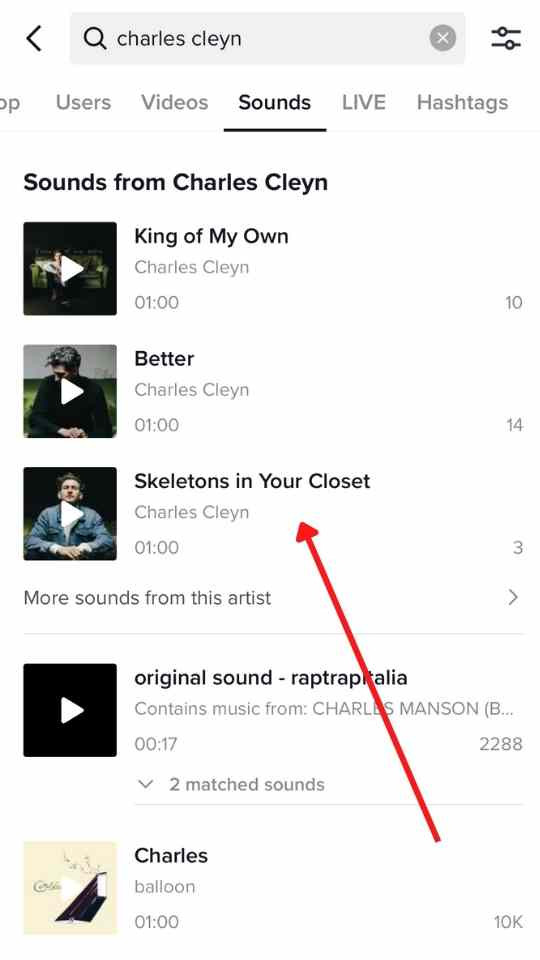 TuneCore Single
TuneCore Single
Alt text: How the main artist name appears on TikTok under a song
- Song Title: Enter the song title accurately.
- Song File Type: Upload your song as a high-quality WAV file (16bit or 24bit).
- Song Artwork: Upload artwork that is at least 3000 x 3000 pixels. Tools like Canva can help create suitable artwork.
- Release Date and Label Name: Schedule your release date if your plan allows. Choose a label name, which may appear on streaming services like Spotify.
- ISRC and UPC Codes: If re-uploading a song, ensure you copy the ISRC and UPC codes from the original release to maintain streaming statistics.
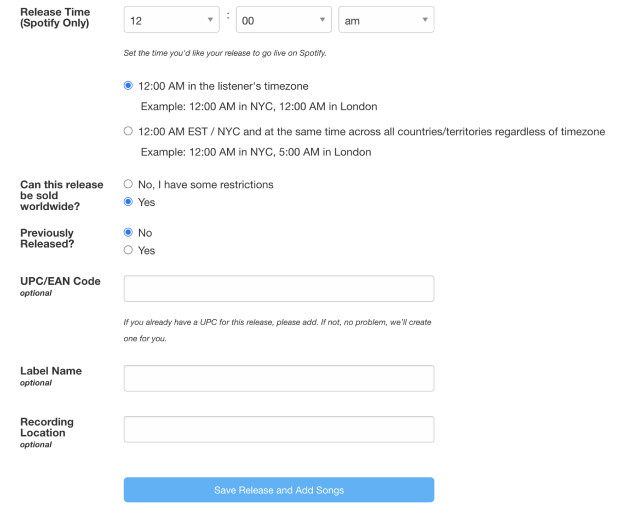 Charles Cleyn TikTok
Charles Cleyn TikTok
Alt text: The interface on TuneCore where you can schedule the release date and set other important parameters for your TikTok release
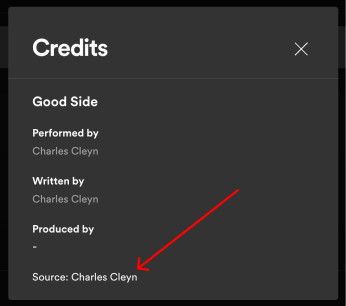 DistroKid Signup
DistroKid Signup
Alt text: An example of how a label name appears under song credits on Spotify, emphasizing the importance of selecting an appropriate label name
4.4. Step 4: Review Your Information
- Double-Check Details: Before submitting, review all entered information.
- Key Items to Verify: Pay special attention to the artist name, song name, song preview time, and scheduled release date.
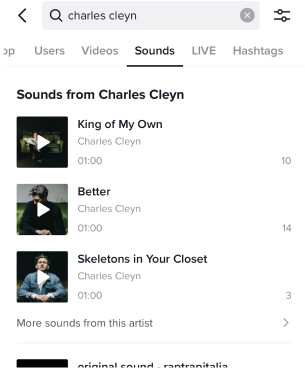 Spotify Song Credits
Spotify Song Credits
Alt text: A view of the artist’s profile on TikTok, showcasing the artist name and song previews that users will see
- Select Song Preview: Choose the most engaging part of your song for the 60-second preview.
4.5. Step 5: Await Release and Engage
- Allow Processing Time: Schedule your release at least 2-4 weeks in advance to allow the distributor time to process your upload.
- Post-Release Engagement: Once your song is live, create videos using your sound to engage your audience.
5. Maximizing Your Impact on TikTok
To truly connect with the TikTok community, you must integrate your music and sounds in engaging ways.
5.1. Understanding TikTok’s Algorithm
Knowing how TikTok’s algorithm promotes content can significantly boost your visibility.
- Key Factors: The algorithm favors videos with high engagement, including likes, shares, comments, and watch time.
- Trending Sounds: Using trending sounds increases the likelihood of your video appearing on the “For You” page.
- Consistency: Regularly posting content keeps your audience engaged and signals to the algorithm that your account is active.
5.2. Creating Engaging Content
Your content should capture attention quickly and encourage interaction.
- Visual Appeal: Use high-quality video and eye-catching visuals.
- Originality: Create unique content that stands out.
- Trend Participation: Participate in trends, and use popular sounds to broaden your reach.
5.3. Engaging with the Community
Building relationships with other users can increase your visibility and engagement.
- Respond to Comments: Engage with your audience by responding to comments and questions.
- Collaborate: Partner with other creators to cross-promote content.
- Use Hashtags: Use relevant hashtags to categorize your content and make it discoverable.
5.4. Analyzing Your Performance
TikTok provides analytics tools to help you understand how your content is performing.
- Track Metrics: Monitor views, likes, shares, and comments to gauge audience response.
- Adjust Strategy: Use analytics to refine your content strategy, focusing on what resonates with your audience.
6. Legal and Ethical Considerations
When uploading sounds to TikTok, it’s crucial to respect copyright laws and ethical guidelines to avoid legal issues.
6.1. Understanding Copyright Law
Copyright law protects original works, including music, from unauthorized use.
- Permissions: Ensure you have the rights or permissions to use any copyrighted material in your videos.
- Fair Use: Understand the concept of “fair use,” which allows limited use of copyrighted material for purposes such as commentary, criticism, or education.
6.2. Obtaining Permissions
If you plan to use copyrighted music, secure the necessary licenses.
- Licensing: Contact the copyright holder or a licensing agency to obtain permission to use their music.
- Creative Commons: Explore using music with a Creative Commons license, which allows certain uses with proper attribution.
6.3. Ethical Considerations
Respecting the rights and creations of others builds trust and credibility within the community.
- Attribution: Always credit the original creator of any sound or music you use.
- Original Content: Strive to create original content and respect the intellectual property of others.
7. Connecting with Streetsounds.net
Enhance your TikTok journey with resources and community support from streetsounds.net.
7.1. Exploring Sound Libraries
Discover a rich selection of high-quality sound effects perfect for enhancing your TikTok content.
- Diverse Range: From realistic urban sounds to unique and creative effects, find the perfect sound to enhance your videos.
- Easy Access: Simple navigation allows for easy browsing and downloading of sounds.
7.2. Reading Informative Articles
Streetsounds.net provides articles on the culture and history of urban sounds.
- Expert Insights: Learn about sound recording techniques and historical contexts.
- Inspiring Content: Find inspiration for your next creative project by reading about how sounds affect urban life.
7.3. Engaging with the Community
Connect with other sound enthusiasts to share ideas and get inspired.
- Networking: Join the online community to meet and collaborate with people who are as interested in sound as you are.
- Shared Experiences: Share your experiences and learn from other community members.
By using streetsounds.net, you’re not just uploading sounds; you’re joining a community that values audio creativity and quality.
8. Latest Trends in TikTok Sounds
Stay ahead with the latest sound trends that dominate TikTok.
8.1. Overview of Current Trends
- Popular Genres: Currently, genres like Afrobeats, Hyperpop, and Lo-fi Hip Hop are trending.
- Viral Snippets: Short, catchy snippets from these genres often go viral, used in challenges, dances, and creative storytelling.
8.2. Emerging Artists and Sounds
- Spotlight: Emerging artists who gain popularity through TikTok often have unique, recognizable sounds.
- Examples: Artists who blend genres or use unusual instruments are particularly successful.
8.3. How Trends Influence Content Creation
- Trend Participation: Using trending sounds can significantly boost visibility, but adding a unique twist is essential.
- Adaptation: Creators often adapt trends to fit their style, creating content that is both current and authentic.
8.4. Table of Trending Sounds
| Sound/Artist | Genre | Popular Use Cases |
|---|---|---|
| “Rush” – Ayra Starr | Afrobeats | Dance challenges, lifestyle content |
| “abcdefu” – GAYLE | Pop-Punk | Venting, relatable scenarios |
| “Good Looking” – Suki Waterhouse | Indie Pop | Fashion, aesthetic content |
| “Jiggle Jiggle” – Duke & Jones | Comedy Rap | Funny skits, comedic transitions |
| “About Damn Time” – Lizzo | Pop | Confidence boosts, getting ready content |
9. The Future of Sound on TikTok
Looking ahead, sound will play an increasingly vital role on TikTok.
9.1. Predicted Developments
- AI Integration: Artificial intelligence may be used to create personalized sound recommendations.
- Augmented Reality: Sounds could be integrated with augmented reality filters, creating immersive experiences.
- Enhanced Monetization: Opportunities for sound creators to monetize their work may expand.
9.2. Impact on Content Creation
- More Creative Freedom: New tools and technologies will allow for more creativity.
- Increased Professionalism: Sound design will become an even more professional skill.
9.3. Potential Challenges
- Copyright Issues: As sound usage increases, copyright enforcement may become stricter.
- Saturation: The growing volume of content may make it harder to stand out.
9.4. Strategies for Adaptation
- Continuous Learning: Stay informed about the latest trends and technologies.
- Adaptability: Be willing to experiment with new sound formats and styles.
- Community Engagement: Continue building relationships with your audience.
10. Frequently Asked Questions (FAQ)
1. How do I upload my original song to TikTok?
You can upload your original song to TikTok by using a music distributor like TuneCore or DistroKid. These services will place your music in the TikTok Music Library, making it available for users to include in their videos.
2. Can I upload a sound directly to TikTok without using a distributor?
Yes, you can upload a sound directly to TikTok by creating a video with your sound. Once the video is posted, the audio becomes available for others to use, but it won’t be in the official Music Library.
3. What are the best dimensions for a TikTok video to ensure the sound works well?
The ideal dimensions for a TikTok video are 1080×1920 pixels. This ensures your video fits the screen properly and the sound syncs correctly.
4. How much does it cost to upload music to TikTok using a distributor?
The cost varies. Some distributors charge an annual fee, while others take a percentage of your royalties. Free options may exist, but they often come with limitations.
5. What file format should I use when uploading music to a distributor for TikTok?
You should use a high-quality WAV file, typically 16bit or 24bit, to ensure the best sound quality on TikTok.
6. How long does it take for my music to appear on TikTok after uploading through a distributor?
It typically takes 2-4 weeks for your music to appear on TikTok after uploading it through a distributor.
7. Can I choose which part of my song is used as the preview on TikTok?
Yes, most distributors allow you to select the portion of your song that will be used as the preview, usually 60 seconds.
8. What is an ISRC code, and why is it important when uploading to TikTok?
An ISRC (International Standard Recording Code) is a unique identifier for your song. It’s important to retain this code if you switch distributors to maintain your streaming statistics.
9. How do I ensure my music gets discovered on TikTok?
Create engaging content using your music, participate in trends, use relevant hashtags, and interact with your audience to increase visibility.
10. What should I do if someone uses my music on TikTok without permission?
If someone uses your music without permission, you can contact TikTok support to report the infringement and request that the content be removed.
In conclusion, understanding how do you upload sounds to TikTok, whether through creating engaging video content or utilizing music distributors, enhances your engagement on the platform. By using strategies and resources from streetsounds.net, you can effectively share your sound and connect with a broader audience. Streetsounds.net is located at 726 Broadway, New York, NY 10003, United States. For further assistance, contact +1 (212) 998-8550 or visit our website at streetsounds.net.
